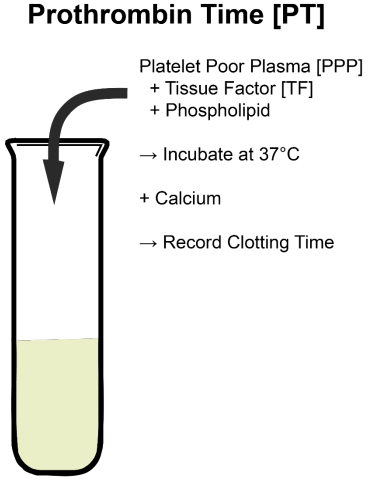A nurse is caring for a client who has a prescription for warfarin. Which of the following laboratory tests should the nurse monitor?
Triiodothyronine
Blood urea nitrogen
Arterial blood gases
Prothrombin time
The Correct Answer is D
Prothrombin time.
Explanation:
When a client is prescribed warfarin, monitoring the prothrombin time (PT) and the International Normalized Ratio (INR) is crucial. Warfarin is an anticoagulant medication that affects the clotting ability of the blood by inhibiting vitamin K-dependent clotting factors. Monitoring the prothrombin time and INR helps determine the client's blood's ability to clot and the appropriate dosage of warfarin to maintain the desired therapeutic range.
Option a (Triiodothyronine) is a thyroid hormone and is not directly related to warfarin therapy.
Option b (Blood urea nitrogen) is a measure of kidney function and is also not directly related to warfarin therapy.
Option c (Arterial blood gases) is a measure of oxygen and carbon dioxide levels in the blood and is not related to warfarin therapy.

Nursing Test Bank
Naxlex Comprehensive Predictor Exams
Related Questions
Correct Answer is B
Explanation
This statement shows that the client understands the importance of regularly checking the oxygen equipment for proper functioning and potential issues. Regular equipment checks help ensure the client's safety and effective oxygen therapy.
Adjusting the oxygen flow rate should be done based on the healthcare provider's instructions and not solely based on subjective feelings. The client should follow the prescribed flow rate and consult their healthcare provider if experiencing increased shortness of breath.
Isopropyl alcohol is not recommended for cleaning the nasal cannula as it can cause drying and irritation. The client should use mild soap and water for cleaning the nasal cannula as per the healthcare provider's instructions.
Synthetic blankets can generate static electricity, which could be a fire hazard in the presence of oxygen. The client should be advised to use cotton or wool blankets, which are non-flammable and safer with oxygen therapy.
Correct Answer is A
Explanation
The correct answer is: a. Clean the stoma using an inward to outward circular motion.
Title: Choice A reason: Cleaning the stoma with an inward to outward circular motion is a recommended practice to prevent infection and ensure that any debris or secretions are cleared away from the tracheostomy site. This method helps to minimize the risk of introducing pathogens directly into the stoma and is considered a best practice in tracheostomy care.
Title: Choice B reason: Cleansing the inner cannula with isopropyl alcohol is not recommended because it can cause irritation to the tracheal mucosa. Instead, sterile saline is typically used for cleaning the inner cannula to avoid any potential damage to the tracheal tissues and to maintain a safe and comfortable environment for the patient.
Title: Choice C reason: Ensuring at least three finger widths of space under tracheostomy ties is not the standard practice. The recommended space is to allow one to two finger widths under the tracheostomy ties to ensure they are secure but not too tight, which could lead to skin breakdown or discomfort for the patient.
Title: Choice D reason: Preparing sterile supplies should be done before removing the inner cannula, not after. This is to ensure that all necessary supplies are ready to use immediately after the inner cannula is removed, minimizing the time the stoma is open and reducing the risk of infection.
Whether you are a student looking to ace your exams or a practicing nurse seeking to enhance your expertise , our nursing education contents will empower you with the confidence and competence to make a difference in the lives of patients and become a respected leader in the healthcare field.
Visit Naxlex, invest in your future and unlock endless possibilities with our unparalleled nursing education contents today
Report Wrong Answer on the Current Question
Do you disagree with the answer? If yes, what is your expected answer? Explain.
Kindly be descriptive with the issue you are facing.
